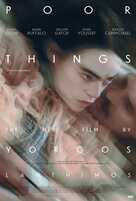| Yorgos Lanthimos always surprises me with his creative mind and strange narratives. I have been a reluctant fan of his since I saw "Dogtooth." "Poor Things" is bizarre and promiscuous at first glance. However, the story is much deeper than it appears. "Poor things" is the reverse story of Frankenstein or maybe a continuation. A continuation possible if Frankenstein lives. |
Mary Shelley's Frankenstein is a collection of different humans, an innocent beast that everyone is afraid of. He kills because he is frightened and doesn't know how to react. He kills because he doesn't understand the social norms of a complicated and discriminatory society that rejects him because of the way he looks. He kills because he is innocent. "Poor Things" is the story of Frankenstein's child. I can not imagine any other actor taking the chances of a weird character like Willem Dafoe does. His character physically looks like a summary of different parts. Dafoe's character, Dr. Baxter, is a living experiment. As he points out in a few scenes, his father used him as an object to conduct his experiments. As such, Dr. Baxter is a Frankenstein. Frankenstein that has decided to raise a child in a grownup body.
Emma Stone is one of the finest young actresses in Hollywood. Every time I see her, I remember the marijuana smoking scene with Michael Keaton in "Birdman" and her heartbroken expression after she says, "No, you don't [matter]." Her performance here is equally praiseworthy. As Frankenstein's daughter, she begins as a child trapped in a grownup body. Throughout the narrative, she learns the societal norms and the absurdity of the civilized world. Her physical appearance changes (body posture, walking, and speech) as she gradually "fits" into the world. However, her innocence is disarming and breaks men's hearts. And since men are the ones who rule society, her innocence threatens the social order. Like father, like daughter.
Only two exits out of this situation would please the ruling class. Either Bella, as Frankenstein's daughter, needs to meet her father's fate. Meaning she needs to be devoured by the civilized and unforgiving society. Or, Bella needs to be assimilated into it. Even though Bella succumbs to the pressure of conformity, she doesn't do it obediently. She commits two acts that make her a living martyr. Bella castrates the macho-infested mentality of male chauvinistic contemporaries. And she, openly advocating her past whoring, makes Max (the man that loves her) accept her for the woman she is - brilliant, intelligent, and way ahead of her time.
Bella's love interests bring us to Mark Ruffalo and Duncan Wedderburn, the other male characters enamored with Bella. Grounded in reality and representing normality, Duncan desperately tries to escape it. His sexual hunger and prowess are a symbol of his rebellion against the norms. But even that male rebellion has its limits. When Bella becomes fragrantly promiscuous and uncontrollably mutinous in her innocent acceptance of sexual normalcy, Duncan is beaten at his own game. Not knowing how to control her, Duncan resorts to the age-old chains of marriage. Not understanding that innocence is gullibly predatory and, as such, superior, Duncan crashes in a most mundane way. However, the decent is enhanced by Ruffalo's brilliant performance. Entertaining and funny, Mark Ruffalo portrays the childish patriarchy of his character, Duncan, with gusto.
This whole package of director and performers wraps up "Poor Things" as one of the most provocative films I have seen and one of the year's best films.
4 / 5
Director: Yorgos Lanthimos
Starring: Emma Stone, Mark Ruffalo, Willem Defoe
Emma Stone is one of the finest young actresses in Hollywood. Every time I see her, I remember the marijuana smoking scene with Michael Keaton in "Birdman" and her heartbroken expression after she says, "No, you don't [matter]." Her performance here is equally praiseworthy. As Frankenstein's daughter, she begins as a child trapped in a grownup body. Throughout the narrative, she learns the societal norms and the absurdity of the civilized world. Her physical appearance changes (body posture, walking, and speech) as she gradually "fits" into the world. However, her innocence is disarming and breaks men's hearts. And since men are the ones who rule society, her innocence threatens the social order. Like father, like daughter.
Only two exits out of this situation would please the ruling class. Either Bella, as Frankenstein's daughter, needs to meet her father's fate. Meaning she needs to be devoured by the civilized and unforgiving society. Or, Bella needs to be assimilated into it. Even though Bella succumbs to the pressure of conformity, she doesn't do it obediently. She commits two acts that make her a living martyr. Bella castrates the macho-infested mentality of male chauvinistic contemporaries. And she, openly advocating her past whoring, makes Max (the man that loves her) accept her for the woman she is - brilliant, intelligent, and way ahead of her time.
Bella's love interests bring us to Mark Ruffalo and Duncan Wedderburn, the other male characters enamored with Bella. Grounded in reality and representing normality, Duncan desperately tries to escape it. His sexual hunger and prowess are a symbol of his rebellion against the norms. But even that male rebellion has its limits. When Bella becomes fragrantly promiscuous and uncontrollably mutinous in her innocent acceptance of sexual normalcy, Duncan is beaten at his own game. Not knowing how to control her, Duncan resorts to the age-old chains of marriage. Not understanding that innocence is gullibly predatory and, as such, superior, Duncan crashes in a most mundane way. However, the decent is enhanced by Ruffalo's brilliant performance. Entertaining and funny, Mark Ruffalo portrays the childish patriarchy of his character, Duncan, with gusto.
This whole package of director and performers wraps up "Poor Things" as one of the most provocative films I have seen and one of the year's best films.
4 / 5
Director: Yorgos Lanthimos
Starring: Emma Stone, Mark Ruffalo, Willem Defoe

 RSS Feed
RSS Feed